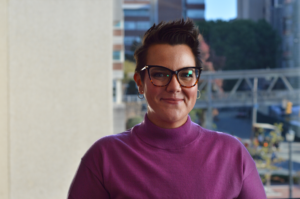
June 15th- 21st is National Black Family Cancer Awareness Week. This week was started by The FDA Oncology Center of Excellence in 2021, reaching the public through a social media campaign to increase cancer awareness in the most vulnerable US population. This year the UNC Lineberger Cancer Center will be hosting and participating in events to help bring awareness to BFCAW. To learn more about this week we interviewed the C.R.E.A.T.E. Initiative’s clinical trial navigator Ashley Rankin Collins.
Can you give us some background on Black Family Cancer Awareness Week and its importance?
National Black Family Cancer Awareness Week is an initiative started by the FDA in 2021. By partnering with community-based organizations, the week is aimed at helping to share information about cancer research and genetic testing and to raise cancer awareness among our Black population, which disproportionately shares the cancer burden.
The black community has the highest mortality rate for most cancers. What are some factors that contribute to this?
In short, structural racism, both historic and currently. A long history of medical discrimination and abuse against minorities and vulnerable populations has led to reduced access to screenings and preventative care, increased likelihood of co-morbidities or other chronic diseases, and less access and participation in clinical trials. Plus, Black patients are more likely to receive a diagnosis at a later stage of disease, potentially limiting treatment options.
What are some of the disparities and inequities against Black Families facing cancer?
Here is a list of disparities
Are black patients less likely to be screened for cancer? If so, why is this?
Yes, for a couple of reasons but most stemming from racism — a lack of access to affordable and convenient screening, an of representation of diverse patients in health education materials, a lack of representation among healthcare providers and clinic staff, and a lack of resources to support someone getting screened (taking time off work, traveling to the screening, etc.)
What are the leading types of cancer affecting the black community?
In Black males – Prostate, lung, and colon cancer. In Black females – breast, lung, and colon cancer.
What are some topics that are of focus and events that UNC Lineberger has planned?
CREATE Initiative is excited to take part in three events:
- June 10 from 10a-2p we’ll be at the Leukemia and Lymphoma Society’s Community Health Fair at Southgate Park in Raleigh to offer information about cancer prevention and education, as well as information about clinical trials and ways to take part in cancer research
- June 19 we’ll be at the Capital City Juneteenth Celebration from 12-6p, to do the same, plus Dr. Marjory Charlot will host the first of our Community Conversations at our table from 12-3p. We invite members of the community to stop by and speak with Dr. Charlot about cancer, cancer screening, and family risks associated with cancer.
- Thursday, June 15 we’ll host a webinar entitled “Engaging the Generations: Genetics, Genomics & Black Families” discussing how cancer screening, genetic testing, and knowing a family’s history plays a role in health and wellness.
What goals does the LCCC have for this week?
We hope to highlight the CREATE Initiative, our Clinical Trial Patient Navigation program, share more information about the importance of diversity in clinical trials, as well as where and how people can take part in cancer research and what resources are available to make their participation easier and more possible.
What are ways that those reading this article can participate and bring more awareness?
Talk about clinical trials with your friends, family, and within your community. The more we can normalize research participation, the less scary it feels and more accessible it becomes. Bring up your interest (early!) with your doctor and ask specifically, “Are there any clinical trials that may be a good fit for me?”.
Can you provide us with some resources for those who want to learn more?
Contact create@med.unc.edu or our Clinical Trial Patient Navigator, Ashley Rankin Collins at: ashley_collins@med.unc.edu